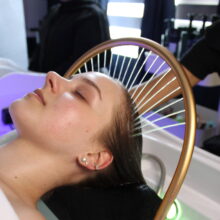Gut Reaction
- Published: Sunday, November 1st 2015
- in Living Well
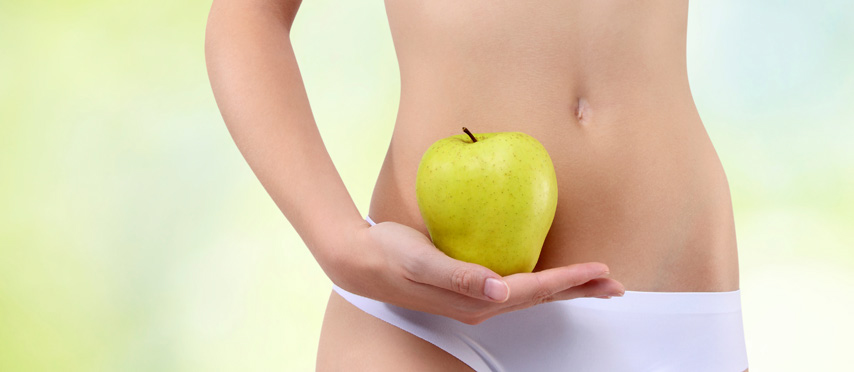
“Listen to your gut…” Though this is a phrase typically uttered when it comes to following your instincts, it is also one of the hottest trends for 2015 and could be some of the best advice for your overall wellbeing.
The concept of optimal gut health (keeping our digestive systems healthy) will not be a new one to some reading this – our guts have been a focus of many health and wellness professionals for some time now. However, look for “gut reactions” to grow even bigger and more credible in 2015 and beyond as the
thirst for knowledge about the gut’s environmental system (technically termed the “microbiome”) picks up more steam. There will be a huge focus on the science of the gut and proving that by altering the make up of our guts, we can take our health and wellness to a new level, improving our immunity and resilience, fighting off serious diseases, reducing our chances for obesity and even facilitating a happy and healthy mind.
Additionally, Dr. Jim Nicolai, author of Integrative Wellness Rules, says that a healthy microbiome allows the immune system to do its job properly and, therefore, makes us more resilient and able to fight off illness and disease. “When our microbiome is healthy, our intestines are able to retain their integrity and work correctly – to put simply, our guts are working for us and not against us,” says Dr. Nicolai.
All of this represents a great opportunity for spa and wellness businesses. We are predicting that cultivating gut health (not to mention the microbiomes in other parts of our bodies – like the skin, the mouth, and even the vagina) will become a mainstream wellness endeavor and there will be significant opportunities for spa and wellness businesses to be a part of this revolution by providing treatments and services or partnering with experts in microbiome health. The “R” word of choice in the spa industry is no longer “renew,” it’s “resilience” – and it looks like our guts might hold the key.
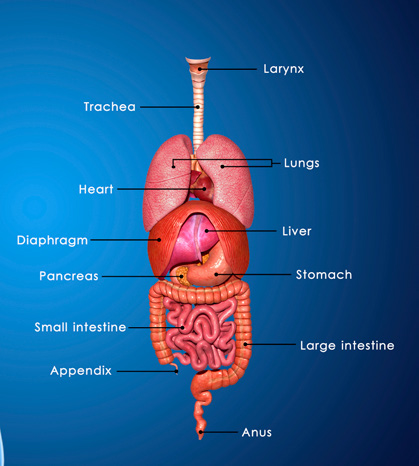
The health industry is in the early stages of researching the gut and its long-term impact on our overall health. This image of the human digestive system shows the many areas that can be affected by diet, an over-reliance on antibiotics and lifestyle–among others.
The How and Why of Guts
The “gut,” essentially the intestinal tract that runs from mouth to anus, is the only organ in the body with its own independent nervous system, an intricate network of 100 million neurons that are embedded in the gut wall. The one-cell bugs that make up the gut are primarily bacteria but there is also yeast, fungus and parasites. What’s been discovered in recent years is that the trillions of microbes that make up the human ecosystem, or microbiome, differ greatly from person to person – and even culture to culture (this could explain why a traveler may have problems when drinking water in a certain country when locals have no issues). Understanding how this complex system works and what exactly it is designed to do has become the focus of much interest and research.
A fast emerging school of thought is that, environmentally, through drugs and diet, we have created havoc in our microbiomes that, if reversed, could combat the emergence of common autoimmune conditions, such as food allergies, diabetes and Crohns disease. Much of the disruption in our bodies’ ecosystem is blamed on the reliance of antibiotics in modern day medicine, but blame is also leveled also on our diets, sedentary lifestyles and our over indulgence of anti-bacterial lotions and potions. All of which many surmise has altered our bacterial ecosystem for the worse.
Because the industry is in the early stages of researching the gut and its long-term impact on our overall health, a large part of this trend will be dramatically more analysis. Already, there is easy access to DNA testing of our own microbiomes revealing how our gut health compares to other people’s (especially compelling if you’re on a special diet) or how our gut health changes and evolves over time.
FUELING THE TREND
Medical Evidence and Studies
This trend is being amped up by a plethora of studies being released about the essential role gut microbes play in our health. Oregon State University recently issued results of a study1 that said personalized diagnosis of an individual’s microbiome could be used to determine which prebiotics or probiotics might help to provide the right, “healthy” balance. The author of the report, Dr. Natalia Shulzhenko, said that contrary to conventional wisdom “our intestines contain more immune cells than the entire rest of our body.”

The Chopra Center at omni la Costa resort & Spa (Carlsbad, CA) helps guests achieve healthier guts by looking at dysfunctions in the digestive system and disturbances of the gut microbiome.
There is other testing being done to prove how the microbes in our gut affect our brain chemistry and the results are pretty amazing. Initial research shows that replacing the gut bacteria of anxious mice with bacteria from fearless mice has had the effect of turning the timid bold.2 And scientists have seen aggressive mice calmed down by altering their microbes through diet or probiotics.
One study that will be of special interest to the spa and wellness industry comes from the National Institutes of Health (NIH), which showed there are specific groups of microbes living in our gut that can protect against obesity.3 Ultimately indicating that, despite a healthy diet and exercise, gut microbes could be working against us when it comes to dropping that last ten pounds. And – if we can figure out how to change their balance – we might be able to tip the scales in our favor.
Rise of Digestive Diseases and Food Intolerance
A key reason for our interest in gut health can be traced to what appears to be a marked increase in digestive diseases and food intolerances. We all know people with mild to severe food allergies, be it nuts, wheat or dairy. And then there’s a seeming non-stop rise in the proliferation of autoimmune ailments, such as Type 1 Diabetes and ALS; as well
as severe digestive track issues, including irritable bowel syndrome and ulcerative colitis. Gut health is a logical means to combat many of these ailments.
A term has taken hold for the cause of these issues: “leaky gut syndrome.” The theory is that an altered or damaged bowel lining allows toxins, microbes, undigested food and even waste to leak into the body causing an immune system reaction that leads to some of these more serious health conditions. Dr. Nicolai explains, “One of the biggest functions of the microbiome is the barrier it creates between the outside of the gut and the inside of the gut. When you have bad bacteria entering the gut, a kind of toxic
invasion, it gets more and more damaged and leaky triggering the immune responses to spike.”
The Crowd-Sourcing Collective
Learning about the microbes in our gut has become a community effort. Because, although many scientists, researchers and medical professionals believe that the microbiome has much to teach us, there is still a lot of work to be done to fully understand its impact. Which is why endeavors like American Gut and uBiome have formed to crowd-source this kind of knowledge. A uniquely modern-day approach, these companies are using direct-to-consumer marketing to get people to participate in DNA sequencing of their microbiome. The concept is that, for a donation of less than $100, you can help build the first-ever database of information about the microbiome while also learning about your own gut’s environment. It’s as simple as taking a lifestyle survey and sending a sample swab. Participants benefit from being part of a scientific breakthrough that could become a very mainstream wellness practice.
THE BUSINESS AND SCIENCE OF THE GUT GROWS
Probiotics: To The Gut and Beyond
Promoting healthy bacteria in the body is becoming big business as the steady rise of probiotics products proves. The proliferation of probiotics is set to increase. In fact, Grand View Research reported in November 2014 that the global market for these good little bacteria is set to reach $52 billion by 2020.
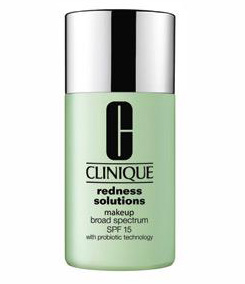
Clinique is among the first-movers that are adding Lactobacillus, a probiotic that is said to treat inflammation, to topical creams, with a promise of reducing redness and soothing the skin.
Probiotics are also being adopted in other wellness areas, including beauty and vaginal health. As long ago as 2009, the Journal of Clinical Microbiology reported on a bacteria that prevents acne and the American Academy of Dermatologists confirmed the same in 2014. Expect to see probiotics proliferating the beauty aisles in the not too distant future with claims that they can calm your skin just as they calm your gut. There are some first movers (e.g., Burt’s Bees, Clinique, and Epicuren Discovery) on this already – companies that are adding Lactobacillus, a probiotic that is said to treat inflammation, to topical creams with a promise of reducing redness and soothing the skin.
You can find microbiomes in other parts of the body too – not just the gut. The vagina is also host to its own microbiome and there is exploration into how understanding it can take vaginal health to a new level by giving women tools to alter the make up of the microbes in their vagina – leading to less yeast infections but also promising to manage their reproductive health. One such company, Sweet Peach Probiotics, is already being discussed in the media.
Food and Diet Fads
What would a gut trend be without trendy foods to ingest? As microbes rise in importance expect fermented foods, like sauerkrauts, kimchi and yogurt, to be the new kale in your life. The process of fermentation is said to imbue our food with probiotics.Expect to see a rise in diets that promise to heal our guts by removing perceived problematic foods, like gluten, difficult to digest grains, sugars and starches.
Spas around the world are designing programs around this exact concept. In fact, the FX Mayr Health Center in Austria has been advocating gut health for over 40 years and the its FX Mayr Cure has long promised to repair the damage done to the digestive tract, reducing vulnerability to illnesses and improving the immune system. In London, the five-star Corinthia hotel, home to ESPA Life, has partnered with the VIVA Mayr Clinic, the sister spa to the original, to offer the Mayr philosophy and regimes in the UK.
The UK’s Grayshott Health Spa in Surry offers a seven day health regime based around the effectiveness of the digestive system with promises to improve cellular functioning, tissue healing and toxin removal. The program was designed by clinical nutritionist Stephanie Moore and natural therapy expert Dr. Elaine Williams, authors of “Gut Gastronomy: Revolutionize your Eating to Create Great Health.” It includes eating nutrient-dense foods that don’t stress the digestive system, alongside two days of intermittent fasting.
Canyon Ranch in the US conducts digestive tract analysis for its guests and is running a special program in 2015 called “Gut Feelings: Gastrointestinal Health and Immune Function” to help people better understand gut health and how it relates to lifelong wellness. Also in the US, the Chopra Center at Omni La Costa Resort & Spa looks at dysfunction in the digestive system and disturbances of the gut microbiome.
The Future is Upon Us: Genetic Mapping
As we discover that the microbiome does much more than simply help us digest food and absorb nutrients, researchers are exploring their role in genetics and how altering the microbiome might allow us to alter our genes. Projects are underway – such as the NIH Human Microbiome Project – to use sequencing technology to analyze their genetic
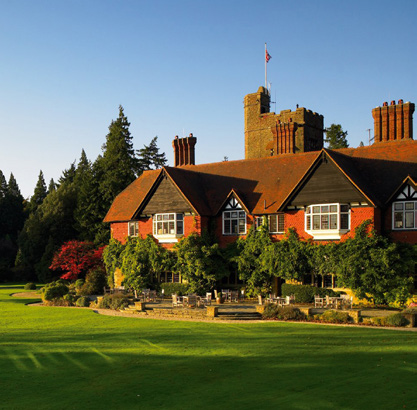
The UK’s Grayshott Hall offers a seven-day health regime based around the effectiveness of the digestive system. The program was designed by clinical nutritionist Stephanie Moore and natural therapy expert Dr. Elaine Williams, authors of “Gut Gastronomy: Revolutionize your Eating to Create Great Health.”
make up and discover the differences between microbes in a healthy versus diseased body. This research promises to lead to new ways to approach the treatment of diseases – including discovering diet and environmental alterations that can have a huge impact on our health.
It Might Be Mental Too
Just as the microbiome is being touted as the next big thing in combating physical diseases and ailments, it is also being carefully looked at when it comes to our mental health.
There are articles and studies in science and psychological journals (including Scientific American, American Psychological Association, Psychology Today and more) about gut bacteria’s affect on the brain – it transmits neurochemicals that the brain uses to process things like learning, memory and mood. Of great interest is the fact that the microbiome produces about 95 percent of the body’s supply of serotonin, the neurotransmitter that is often associated with mental disorders like depression. The thought in
some mental health circles is that managing chronic gastrointestinal disorders through the microbiome could treat the anxiety and depression that often associated with these disorders.
THE FUTURE
With all this new information comes a much broader awareness of the impact of diet and environment on our health and wellbeing – something that the spa and wellness industry will greatly benefit from, thanks to a wide array of nutritional and diet expertise, as well as its natural focus on detoxification and cleansing.
Research proving how we can effectively change our gut’s environment for the better is still in its infancy – but there’s no denying the tantalizing possibilities of using diet, environment, and probiotics to combat much of what ails us – through our gut–and beyond!
SOURCES
- “Bridging immunity and lipid metabolism by gut microbiota.” Greer RL, Morgun A, Shulzhenko N. Oregon State University, Corvallis.
- Science Direct, “The adoptive transfer of behavioral phenotype via the intestinal microbiota: experimental evidence and clinical implication.” June 2013.
- NIH Research, Sept 2013
TOP 10 SPA & WELLNESS TRENDS FOR 2015
- Forest Bathing: Mindfulness Meets Nature
- Cannabis: New Spa & Wellness Connections
- Wellness Traditions from the Islamic World
- Industrial Revolution: Blue Collar Wellness
- Wellness Homes, Communities & Cities
- My Fitness. My Tribe. My Life.
- Spa On Arrival (& En Route)
- Hyper-Personalized Beauty
- Gut Reaction
- Beyond the Stars



